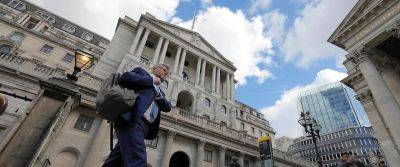Bank of England hits stop on rate hike run as economy slows
By William Schomberg, Andy Bruce and Suban Abdulla
LONDON (Reuters) -The Bank of England halted its long run of interest rate increases on Thursday as Britain's economy slowed and inflation fell, but Governor Andrew Bailey sought to stress the central bank did not think its job was done.
A day after Britain's fast pace of price growth unexpectedly slowed, the BoE's Monetary Policy Committee voted by the narrowest margin of 5-4 to keep Bank Rate at 5.25%.
Four members — Jon Cunliffe, Megan Greene, Jonathan Haskel and Catherine Mann — voted to raise rates to 5.5%.
It was the first time since December 2021 that the BoE did not increase borrowing costs.
Sterling fell by more than half a cent against the U.S. dollar, to its lowest since late March, and also weakened against the euro as investors downgraded their bets that interest rates would be increased further.
But rate futures suggested they still saw a 50% chance of Bank Rate rising to 5.5% by the end of this year.
Britain's economy, hit hard by Brexit, the COVID-19 pandemic and the surge in gas prices triggered by Russia's invasion of Ukraine, has been struggling with the highest inflation rate in the Group of Seven.
But growth remains fragile, heightening the risk that the BoE's 14 back-to-back rate hikes will push the economy into a recession.
«There are increasing signs of some impact of tighter monetary policy on the labour market and on momentum in the real economy more generally,» the MPC said in a statement.
It cut its forecast for economic growth in the July-September period to just 0.1% from August's forecast of 0.4% and noted clear signs of weakness in the housing market.
Growth for the rest of the year was likely to be weaker than previous forecasts,
Read more on investing.com

























